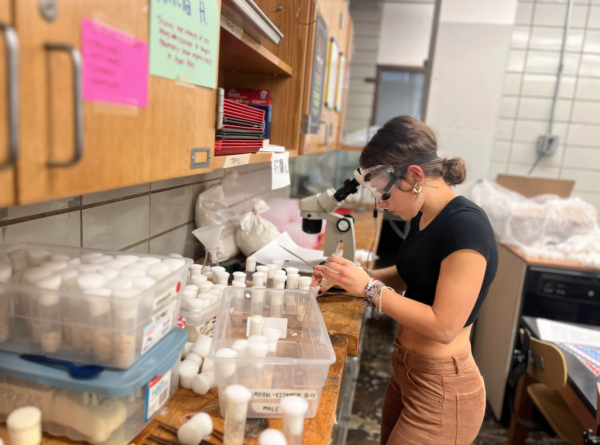It’s another winning season for students in Investigative Research Design and Innovation (IRDI).
This year-long science course, taught by Allison Hennings, provides students with opportunities to submit their research projects to competitions.
The entire class was chosen as semi finalists for state at the Junior Science and Humanities Symposium (JSHS), which took place Feb. 24. This prestigious competition is sponsored by the U.S. Department of Defense.
Three OPRF seniors will advance to JHSH nationals. Marina Sjoblom, who won second place overall, Sahiba Dhillon, who took third place overall, and Jenna Ahn will attend the national competition in Albuquerque, New Mexico from May 1 to 4. They will be among 245 high school students who present original scientific research.
Also, for the first time this year, IRDI students entered the Illinois Junior Academy of Science (IJAS) regional competition. The two-part event included a paper symposium on Feb. 28 and a poster symposium on March 1.
Both events took place at Adlai E. Ste-
venson High School in Lincolnshire.

All 16 students in the class qualified for the IJAS state tournament, to be held at Millikin University May 3 and 4. Not only that, for the first time an Oak Park and River Forest High School student was selected to compete at International Regeneron ISEF, the world’s largest pre-college STEM competition. Junior Amelia Hammersley will present her research at the event in Los Angeles from May 11 to 17. Finalists compete for almost $9 million in scholarships and awards.
Hammersley’s dedication to her research comes from a deep connection to the field of neuroscience. “My sister had a really severe concussion, and she was hospitalized,” she said. “I always knew that I wanted to help people but wasn’t sure how I wanted to do that. I heard about this class, and I was then able to further my interest in neuroscience that was found because of my sister, along with my desire to help people.”
For her IRDI project, Hammersley developed a new medication for traumatic brain injury (TBI) designed to cause fewer side effects and provide more affordable treatment for people in less-developed countries. The medication, which consists of a natural compound called Celatrol and Naproxen, “could have the potential to have a positive impact on over 69 million individuals globally that sustain TBI,” Hammersley wrote in a project description.
Also at the IJAS competition, seniors Noah Campbell and Sahiba Dhillon were awarded the Regional Junior Stockholm Regional Water Prize. Both qualified for state for this international symposium, which is held in Sweden every August. Dhillon’s work is focused on removing lead from water using commonly found materials, and Campbell’s research uses bacteria to change the pH of water turned acidic by mining for heavy metals.
All IRDI students work extremely hard on their projects and presentations in order to achieve their goals. In class, they practice presenting their projects with a timed speech.
Skills like organization, public speaking and time efficiency contribute to their overall success in their IRDI class as well as the scientific innovation in their projects.
“There are many intangible skills students gain from this class that sometimes don’t necessarily come across in other areas of their lives,” Hennings said. “These include gaining confidence in public speaking, being comfortable with their writing abilities and time management.”
IRDI can be taken for as many as three years (six semesters). Each year, the course offers students additional advanced opportunities for research. For the first semester, students focus on gathering sources and quality evidence to strengthen their research and finalize their projects–the most vital part of the IRDI project. They also seek out expert mentors from around the world.
“The expectations can be really hard to manage sometimes,” said Sjoblom, who has taken the class for two years. “Last year I was about a month behind in the class because it was really hard for me to find mentors. I sent out 36 emails and I luckily ended up with two mentors and later on found a third.”
“It was challenging because by the time other students were starting their experiments, I was just figuring out my materials,” Sjoblom added. “I had to learn to not give up and figure it out even though it was really tough.”
For many IRDI students, their passion for their project is what helps produce their outstanding results and accomplishments. “Students walk into IRDI and ask: what do I need to be successful?,” Hennings said. “The most important item I tell them is that they don’t have to be the most book smart, but they do have to be a hard worker. I tell them that they will pick something that they want to investigate for the entire year. Being passionate about your area of research is definitely the number one thing that will sustain you through the challenge.”
Embracing the challenges and rigorous expectations, IRDI students have advanced toward their goals and continue to progress for even more extraordinary results. IRDI students are motivated to persist from the encouragement and reassurance by those who surround them.
Anne Claud, a junior IRDI student, said, “The people around me have been great supporters. I have amazing teachers like Ms. Hennings and [mentor] Mr. Michalek, who always kept me motivated, and I have wonderful parents and mentors.”

